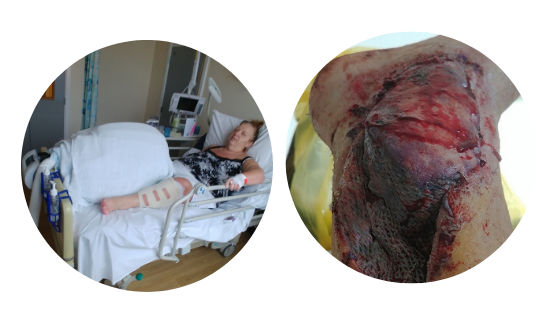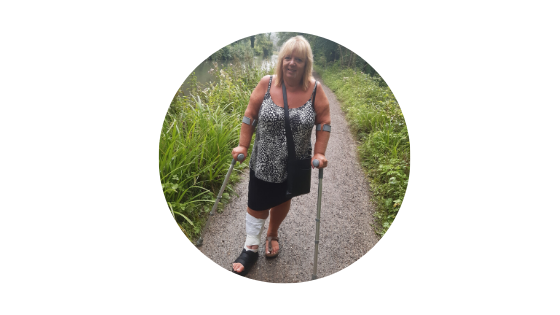News Hub
Motorcyclist wedged under car in accident highlights importance of air ambulance

Wedged under a car after she was involved in a road traffic collision, motorcyclist Debs Morley was in excruciating pain as she felt the skin on her right ankle being burnt by the heat from her bike’s exhaust pipe.
During what she describes as “the longest 20 minutes of my life” until the Fire Service lifted the car off her using specialist lifting bags, she couldn’t move.
By the time she was freed, her ankle had been burnt right down to the bone. She had suffered a fracture to her right leg under the knee, two fractured bones in her right foot and two fractures in her right thumb.
Derbyshire & Leicestershire Air Ambulance (DLRAA) arrived at the scene – at the junction of the A6 and B6012 near Rowsley, Derbyshire – after a 999 call was made by a witness to the accident.
Even though she was still under the car, the critical care crew assessed Debs and gave her strong analgesic medication while the Fire Service did their work.
“I immediately felt confident that I was in the right hands. They were very reassuring and told me everything they were doing and why. I was given gas and air for the pain and they put a cannula in the back of my hand to give me further pain relief,” she says.
Once she was freed, the DLRAA doctor and critical care paramedics treated Debs’s burns and made her comfortable before putting her on a stretcher and carrying her to the helicopter – which had landed in an open area adjacent to the scene of the accident.
It took just nine minutes to fly Debs to the nearest major trauma centre, the Northern General Hospital in Sheffield – a journey that would have taken 35 minutes on a blue light transfer in a land ambulance.
“The speed the air ambulance got me to hospital made all the difference. The pain was hard to bare initially, the terror of being under a car with my leg burning and unable to move was hard to cope with. To suddenly be picked up, carried off and taken to a hospital so quickly to find out what my injuries were was beyond wonderful. It probably saved my sanity as well as my leg. The speed and competence with which they work is superb, words can’t really express how thankful I am,” she says.
On arrival at the hospital, the air ambulance crew did a hand over to a full trauma team in the A&E department and Debs was taken for urgent X rays to assess the extent of her injuries.

After a few days recovering at home in Mansfield, she was subsequently admitted to the first of three hospitals and over the course of 14 weeks underwent extensive inpatient and outpatient treatment, which included five operations.
At Nottingham City Hospital Burns Unit she had a skin graft on her ankle which wasn’t successful, so she had to undergo nine hours of free flap reconstruction surgery. This involved taking an area of skin, muscle and blood vessels from the back of her left calf and using it to fill the gap in her right ankle.
Unfortunately, there were complications which led to another five-hour emergency operation to put it right.
During her recovery period in hospital, Debs had heat treatment and leech therapy every hour for two and a half weeks to help prevent blood clotting on the wound as well as physiotherapy, occupational therapy and treatment for Post-Traumatic Stress Disorder.
Fourteen months since the accident, Debs is now walking with crutches and only has to use a wheelchair for long distances.

Life is less active than it was before the accident and she isn’t able to return to her job as a Service Manager for a national charity. She still needs hydro and physiotherapy every week and faces the prospect of having another operation. However, Debs is very grateful for the crew from DLRAA coming to her rescue.
She says:
“I believe it is important to share my story to highlight the fantastic work of the local air ambulance charity. They were first on scene when I had my accident, gave me pain relief and lots of reassurance.”
“I still struggle to believe this service is not funded and has to rely on donations and fundraising. As someone who has been on the receiving end of their care and treatment, I want to highlight what an amazing role they play. I will always be grateful for what they did for me.”
Lifesaving Missions like Debra’s wouldn’t be possible without public support – The coronavirus pandemic has had a significant impact on the charity. Due to the closure of its retail division, suspension of its reuse collections and cancellations of fundraising events, the charity is facing a projected net loss of at least £2.18M for the months April to June.
Your local air ambulance is helping to save more lives and the dedicated crews are continuing their lifesaving missions through this difficult Coronavirus pandemic – providing vital, critical care support to the NHS.
To find out more how you can help support your local air ambulance, click here
Or to share your inspiring story with the charity, click here
